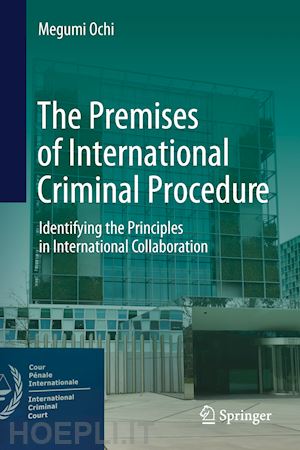
Questo prodotto usufruisce delle SPEDIZIONI GRATIS
selezionando l'opzione Corriere Veloce in fase di ordine.
Pagabile anche con Carta della cultura giovani e del merito, 18App Bonus Cultura e Carta del Docente
How does international criminal procedure differ from any domestic legal principles and why? What premises of international criminal procedure do give rise to such differences? Can we provide any unified socio-legal explanation for the differences between the procedure of the International Criminal Court and the domestic legal principles? This boils down to the question: what are the premises inherent in international criminal procedure? Applying the premise theory of general principles of law, this book conducts a comparative analysis of various general principles of international criminal procedure with corresponding principles that are valid domestically and in general international law and identifies special premises in the procedural law of the ICC.
This book discloses the four points that have not been identified in previous studies. (A) the fact that the value of international criminal procedure frequently mentioned in previous studies has not actually had much of an impact: (i) the premise of “seriousness of the core crime” has little influence at the procedural level; and (ii) the premise of deterring illegal investigations has little impact. (B) the factors that have not been recognized as circumstances or values on which international criminal procedure is premised in previous research significantly influence international criminal procedure: (iii) the entire procedure is based on the primitive premise of speed and “first come, first served”; and (iv) the impact of the premise of consideration for national sovereignty, which is associated with the fact that the ICC is an international organization based on a treaty, is critical. The ICC's institutional premises of the value of expeditiousness and lacking centralized control over its “limbs” have had a significant impact on the various aspects of international criminal procedure.
Introduction: What Are the Premises Inherent in International Criminal Procedure?.- Principles Concerning Parallel Investigations and Parallel Prosecutions of Core Crimes.- Principles Concerning Priority of Extradition for Core Crimes.- Principles Prohibiting Core Crimes Trials in absentia.- Principles Concerning Redress for the Rights of Accused Persons in International Criminal Justice.
Megumi Ochi is an academic and legal professional who specializes in International Criminal Law and currently serves as an associate professor at the Graduate School of International Relations, Ritsumeikan University, Kyoto, Japan. She obtained her PhD in Law from Osaka University, Japan, and an LL.M. from Leiden University in the Netherlands. She has been a senior fellow at Case Matrix Network (CMN) (2016-2024) and an active member of the governing bodies of the International Association of Penal Law (AIDP) (2014-2024). She has published two monographs on international criminal procedure in Japanese and co-edited three books on international criminal justice in English.











Il sito utilizza cookie ed altri strumenti di tracciamento che raccolgono informazioni dal dispositivo dell’utente. Oltre ai cookie tecnici ed analitici aggregati, strettamente necessari per il funzionamento di questo sito web, previo consenso dell’utente possono essere installati cookie di profilazione e marketing e cookie dei social media. Cliccando su “Accetto tutti i cookie” saranno attivate tutte le categorie di cookie. Per accettare solo deterninate categorie di cookie, cliccare invece su “Impostazioni cookie”. Chiudendo il banner o continuando a navigare saranno installati solo cookie tecnici. Per maggiori dettagli, consultare la Cookie Policy.